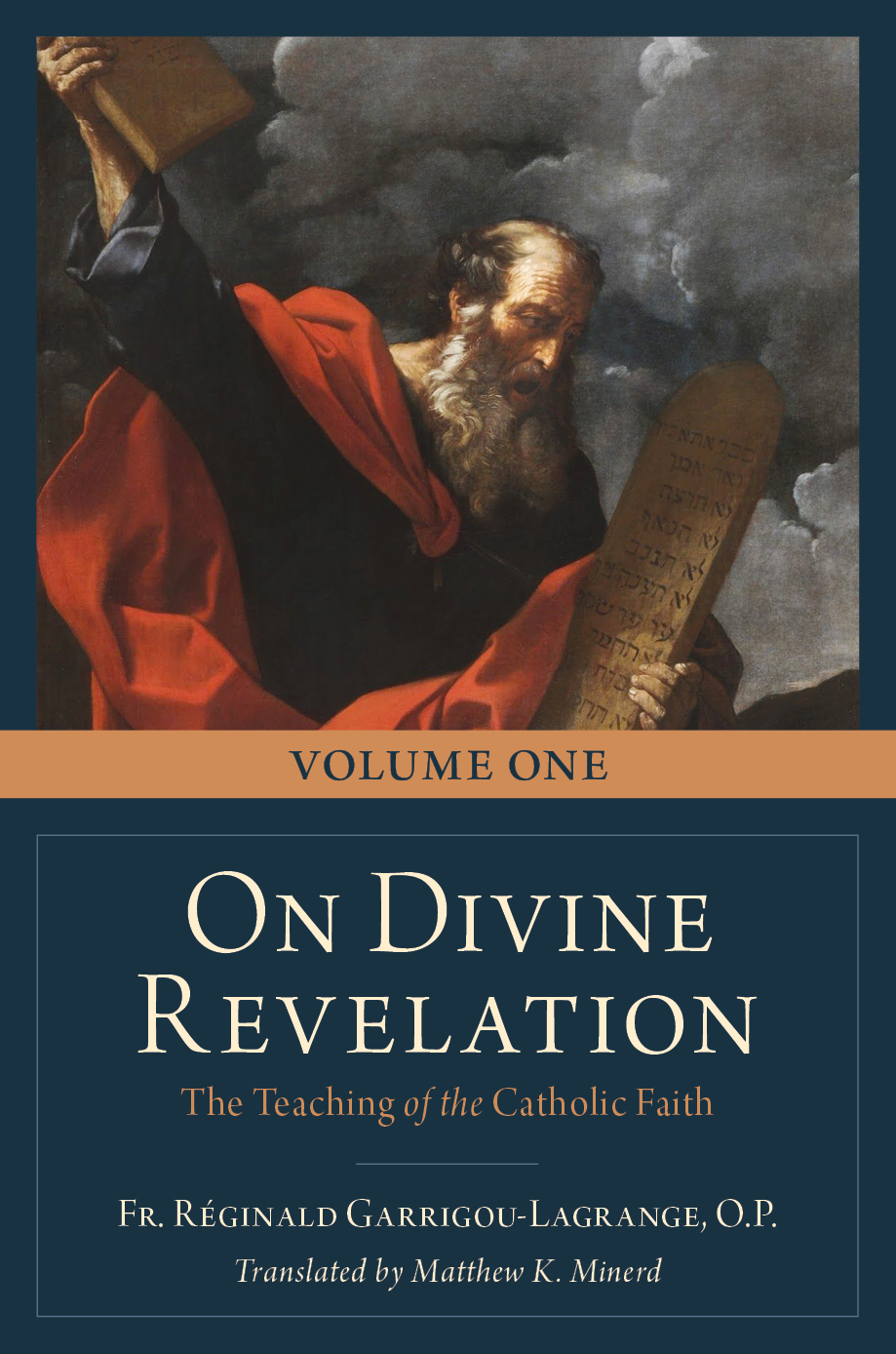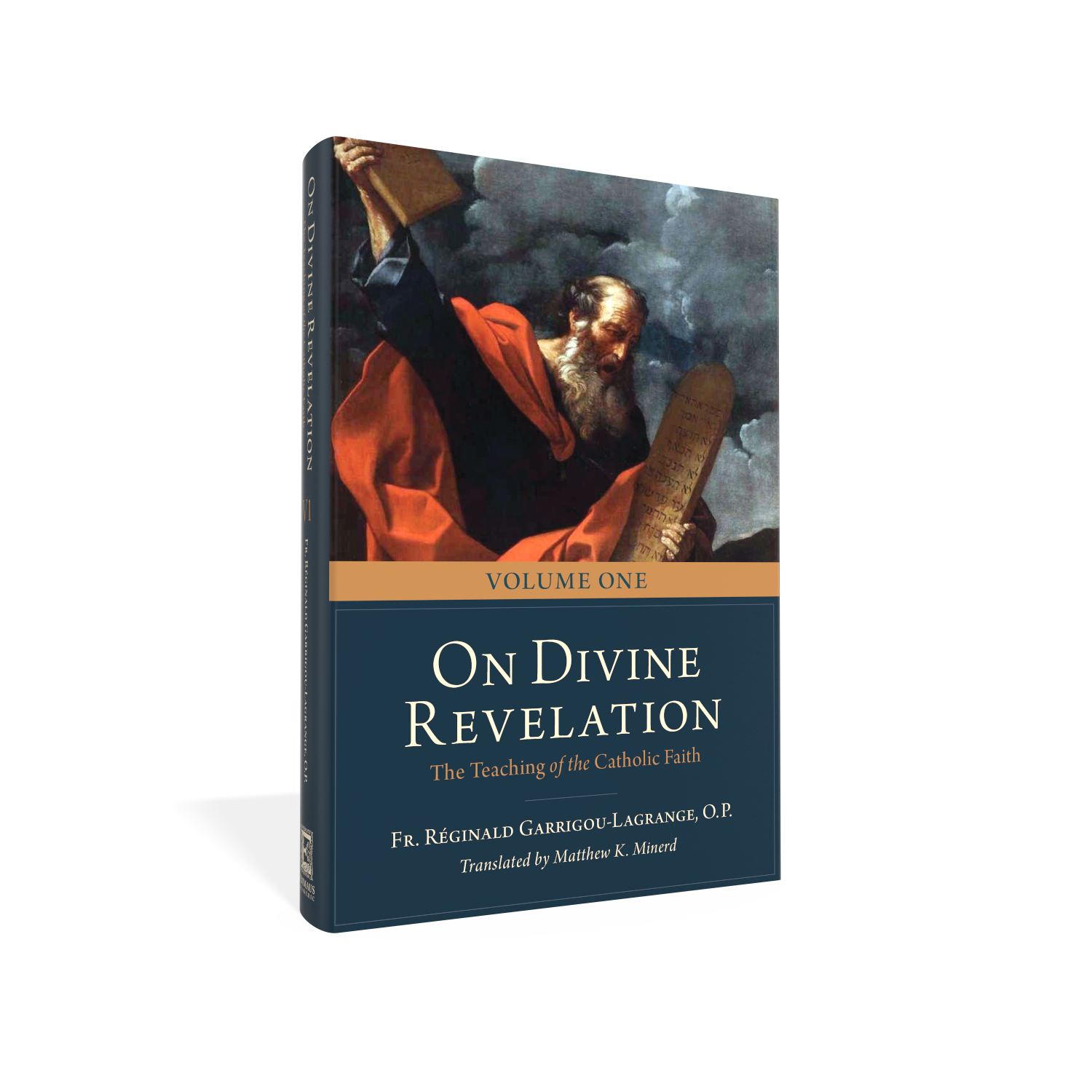In On Divine Revelation—one of Garrigou-Lagrange’s most significant works, here available in English for the very first time—he offers a classic treatment of this foundational topic. It is an organized and thorough defense of both the rationality and supernaturality of divine revelation. He presents a careful yet stimulating account of the scientific character of theology, the nature of revelation itself, mystery, dogma, the grace of faith, the powers of human reason, false interpretations thereof (rationalism, naturalism, agnosticism, and pantheism), the motives of credibility, and much more.
Though written a century ago, On Divine Revelation will restore confidence in theology as a distinct and unified science and return focus to the fundamental questions of the doctrine of revelation. It also serves as a salutary corrective to contemporary theology’s anthropocentrism and concern with what is relative in revelation and religious experience by reorienting our theological attention to what is most certain, central, and sure in our knowledge of divine revelation: the Triune God who has revealed his inner life and salvific will.
Readers will see the great splendor of the gift of divine revelation: radiant with credibility before the gaze of reason and drawing our supernatural assent to the mysteries through the gift of faith. As Fr. Cajetan Cuddy, O.P. observes, “On Divine Revelation . . . is a stunning work of inestimable value. No other subsequent work on this topic has come close to meeting it (much less surpassing it).”
About the Author
Réginald Marie Garrigou-Lagrange, O.P. (1877–1964), was a French Catholic theologian and leading Thomist of the twentieth century who taught at the Dominican Pontifical University of St. Thomas Aquinas, the Angelicum, in Rome from 1909 to 1960.
About the Translator
Matthew K. Minerd is a Ruthenian Catholic, husband, and father, serving as Professor of Philosophy and Moral Theology at the Byzantine Catholic Seminary of Saints Cyril and Methodius in Pittsburgh, PA. He has been published in Nova et Vetera, The American Catholic Philosophical Quarterly, The Review of Metaphysics, Études Maritainiennes, Downside Review, and Homiletic and Pastoral Review. He has also served as a translator or editor for volumes published by Emmaus Academic, Cluny Media, and The Catholic University of America Press.





Charles Schmidt –
It is rational and absolutely necessary to believe in God and to believe in Divine Revelation
On Divine Revelation Volume One is a magnificent book. The author, Reginald Garrigou-Lagrange, was a French Catholic theologian and a leading Thomist of the 20th century. The purpose of this book is to explain why Catholic divine revelation is important, why it was necessary, and how to verify that the Catholic Bible and dogma are true. Not only is this book about divine revelation, but it is also an apologetics books defending the truth of Catholicism, which is based on the Bible.
Divine revelation is important to leading a good life. The creator of a thing determines its purpose, which is its good, so God determines what is good and God also determines the purpose of human life and man’s destiny. Without divine revelation, philosophy only has a vague idea of what the good really is, and what the true purpose of life is.
Divine revelation was necessary because history has shown that, with revelation, societies and religions have fallen into serious errors about the nature of God and about ethical behaviors. Revelation enlightened the world and ennobled the world. Likewise, revelation was necessary to enlighten and correct philosophy, which was blind without revelation. Revealed religion is necessary for achieving life’s ultimate end.
Garrigou-Lagrange points out some important things about faith. Here is a quote: “You can’t live without faith, and you can’t have eternal life without faith in God. So the most important faith you can’t live without is faith in God.” And he points out that faith in God’s revelation is superior to human reason, as follows: Reason was made to serve faith and revelation because faith and revelation perfect reason. God is Truth, Beauty and Goodness, which is what reason seeks. Faith sees deeper than reason, and divine revelation is wiser than reason, which is why faith is superior to reason and perfects it.
Philosophy is founded on reason, and Garrigou-Lagrange lists the first principles of reason, as follows:
• Principle of noncontradiction: Being is not non-being. [Formal cause]
• Principle of identity: Being is being; non-being is non-being. [Formal cause]
• Principle of substance: Everything which exists is a substance; a phenomenon is only that by which something appears. [Formal cause] A substance is a natural kind of thing and exists in its own right. Accidents exist only in substances and are modifications that substances undergo, but accidents do not change the kind of thing that a substance is.
• Principle of raison d’etre: Every being has a reason for existing, either in itself or in another. In other words, everything thing that exists has a purpose. [Final cause and Efficient cause]
• Principle of efficient causality: Every contingent being is efficiently caused by another being. [Efficient cause] The principle of efficient causality denies that something more can be produced from something less. Stated another way, the principle of efficient causality denies that the perfect could arise from the imperfect. [That life could arise from mindless matter, that life could evolve into more complex species, and that human intelligence could arise from non-intelligent matter are beliefs that contradict the law of efficient causality.]
• Principle of finality: Every agent acts on account of an end. [Final cause]
• Principle of change: Every change presupposes a changeable subject. [Material cause]
We cannot reason without these first principles of reason, which are based on Aristotle’s four causes, and these principles are supported by common sense. We are certain that these principles of reason are true – they are knowledge and not opinion, because to deny them results in absurdity.
Here is Garrigou-Lagrange’s superb short summary of the history of philosophy, showing how divine revelation corrected and ennobled philosophy:
In the Greeks, who greatly cultivated philosophy, we first find the polytheism that was fought against by the Greek philosopher Xenophanes, and the first philosophers, like the Ionians, Heraclitus and Democritus, were materialists. Parmenides and the Pythagoreans, along with Anaxagoras, posited certain principles of spiritualism but did so imperfectly and with the admixture of grave errors. After a long time – namely, after two hundred years of speculation among this people, who were endowed with great speculative gifts – there appeared, with Socrates, the true method of the perennial philosophy, along with its essential lineaments, which Plato developed and Aristotle composed into a scientific system, though not without a number of errors regarding providence and free creation properly so called, nor did these philosophers firmly assert the immortality of the soul. As regards morals, Plato commended the idea of sharing wives – nay, also the exposing of infants if they were deformed. Likewise, Aristotle made excuses for the wanton images of the gods depicted in the temples. However, immediately after Aristotle, Greek philosophy fell anew into materialism with the Epicureans and Stoics, or into skepticism with the Pyrrhonists. Neoplatonic philosophy imitated Christianity, though, doing so while denying the freedom of creation, teaching the pantheistic emanation of things from God and explaining evil through matter.
In the Middle Ages, with the exception of certain pantheists and the Averroists, philosophy in the schools was rightly subordinated to the truths of the faith and thus was preserved from error. [Christian revelation healed philosophy. Medieval Christian philosophy was preserved from error.]
In modern thinkers, who not only distinguished philosophy from faith but, going further, separated them, we find the immediate appearance of sensualism and materialism in the British empiricists or the immoderate idealism of Descartes alone with many errors leading to voluntarism and to subjectivism. Voluntarism is the theory holding that the will, rather than reason, is the basic factor in human behavior. Subjectivism is an ethical theory holding that personal attitudes and feelings are the sole determinants of moral values. There are many errors even in Leibnitz’s writings, especially psychological determinism, both in God and in us. Psychological determinism states that all behavior is governed by internal or external forces over which we have no control, so free will is an illusion. Finally, with Kant, we arrive at agnosticism and with Fichte, Schelling and Hegel at pantheistic evolutionism. Today, countless philosophers are positivists. Hence, they deny the necessity of the principles of reason. God’s knowability, and the foundation of moral obligation, and they acknowledge only an obligation that is externally imposed by society for preserving what is useful for life in common. Thus, a practical materialism grows in strength, holding that “authority is nothing else than the sum of the number and forces of matter.” [Modern philosophy, having abandoned Christian revelation, has fallen into numerous errors.]
All of this provides us with a confirmation concerning the moral necessity of the revelation of the natural truths of religion. Hence, the Church, who is the guardian of the deposit of revelation, is also called the guardian of reason, as is clear in Pius X’s encyclical Pascendi, which defends the powers of reason against agnosticism.